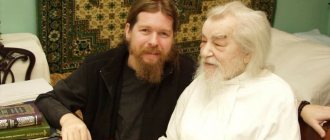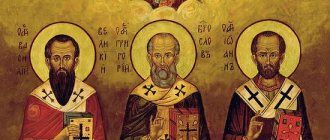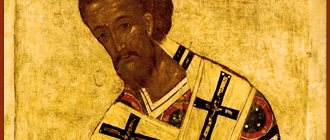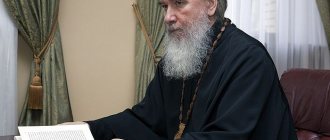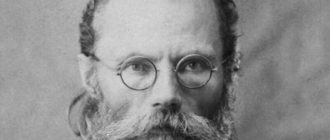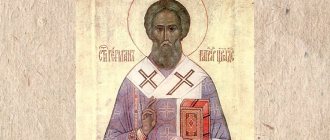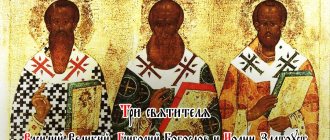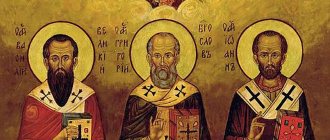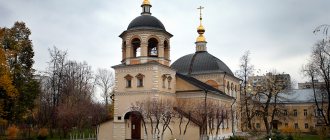"Save me, God!".
Thank you for visiting our website, before you start studying the information, please subscribe to our Orthodox community on Instagram, Lord, Save and Preserve † - https://www.instagram.com/spasi.gospodi/. The community has more than 60,000 subscribers. There are many of us like-minded people and we are growing quickly, we post prayers, sayings of saints, prayer requests, and timely post useful information about holidays and Orthodox events... Subscribe. Guardian Angel to you!
Many saints left behind not only the memory of their deeds and miracles, but also other works that do not lose their popularity in our time. So the guide to the spiritual life of Barsanuphius the Great is considered to be such. In it, he tried to explain in detail what is worth doing and what is not necessary if you want to observe a godly life.
Life of a Saint
He was born in Egypt. He was the most zealous ascetic. There are references to the fact that not far from the monastery of Avva Serida, he built himself a small cell. There he spent quite a long time serving the Lord and zealous prayer. This is how a life dedicated to God began.
The best article for you, go to: St. Seraphim Vyritsky: life, relics, prayer
For such devotion, he was given the gift of clairvoyance. A little later he moved to an even more cramped room, where he spent 50 years working on his works and exploits. Constant prayers allowed him to achieve a high degree of spiritual perfection. There are mentions of his exploits in some manuscripts.
Regarding the date of death, but it is also not clear. Most are inclined to believe that he ended his life in 563. His memorial day is considered to be February 19.
Path to Service
There is practically no reliable information about the exact date of birth and family of the saint. The historian Evagrius notes that in the second half of the 6th century he was already revered as a great ascetic and saint of God.
Venerable Barsanuphius the Great
The Latin version of his life tells that in his youth he went as a pilgrim to the Holy Land, visited several monasteries and took monastic vows from an ascetic named Marcellus. Barsanuphius lived with his spiritual mentor, and after the death of his teacher he was a wandering hermit for several years.
- At one time, the saint settled in the monastery of Abba Serida, which was located south of the Palestinian city of Giza. Many other monasteries wanted to see St. Barsanuphius within their walls, but he chose the one that never looked for him.
- Initially, the saint settled in a cell located on the territory of the monastery, but soon he retired into seclusion. The ascetic himself noted that this step can be compared to the symbolic imprisonment of oneself in an imaginary coffin for the sake of the glory of the Lord. The saint spent more than 50 years in a secluded cell, strictly monitoring his own activities. He accepted practically no one, thereby showing that everyone was equal to him.
- However, once a week Abba Serid himself came to the hermit and brought three pieces of bread and some water. The guest read to Barsanuphius questions that interested the parishioners of the monastery and wrote down the ascetic’s answers. Some monks began to doubt their truth, since the hermit was completely inaccessible to everyone except Serid. Therefore, many decided that it was the founder of the monastery who composed these moralizing and spiritually useful answers. Then Barsanuphius received all those who doubted and washed the guests’ feet.
- The great hermit never gave up his work despite constant pain and weakness. He forgot about food and water, saying that the Holy Spirit was everything he needed. After many years of practice, God gifted the holy hermit with the ability to see the true world. He was appointed spiritual leader of many nearby monasteries, teacher of clergy and laity, despite the fact that the ascetic was actually locked in his secluded cell. The great hermit became famous in the area for his unshakable humility, ability of sound reasoning, insight, love for all beings and miracles.
Interesting!
The Latin version of the life says: Saint Barsanuphius once broke his vow of solitude and went to Constantinople to intercede for the monks of his region who showed disagreement with the theological teachings of Origen. Emperor Justinian wavered in his decision, now taking the side of this situation, now rejecting it, so often one of the two opposing sides suffered from the reproaches of the ruler. Barsanuphius, seeing the emperor’s indecision in this complex theological issue, advised him not to be afraid of worldly things and to rely on the will of the Almighty.
What does a saint help with?
His abilities were demonstrated more than once in those cases when people turned to him for help. In most cases they are associated with petitions:
- about healing;
- about the gift of making the right decision;
- about guidance on the true path;
- forgiveness of all sins.
The most common is the reading of the prayer of Barsanuphius the Great for forgotten sins. After all, many will agree that we do not always remember what minor sins we have committed. In this case, reading it will help.
“Sovereign Lord, since it is a sin to forget one’s sins, I have sinned in everything against You, the One Knower of the Heart; You forgive me everything according to Your love for mankind; This is how the splendor of Your glory is revealed when You do not repay sinners according to their deeds, for You are glorified forever. Amen."
You can pronounce it in front of the icon or without it. It is important at the moment to focus on the words that come out and try to clear your thoughts. Strong faith and an open soul can create many miracles.
Education of a Saint
Barsanuphius was well educated. His student, Abba Dorotheos, was also educated, and Barsanuphius did not see this as any obstacle to salvation, but guided the student, taking advantage of his education as well.
In general, the holy fathers believed that reason should not be discarded, but rather deified. They were open to knowledge. John of Damascus, St. Augustine, and Basil the Great write a lot in their books about the achievements of contemporary science. Now these fragments seem absurd, but this is not the fault of the fathers - they trusted the knowledge of their time.
For example, St. Theophylact of Bulgaria talks about the origin of pearls in the sea like this: a mollusk opens its shell, and lightning strikes there, lightning gives birth to a shell. He connects this ancient scientific assumption with the Birth of Christ from the Virgin by the inspiration of the Spirit.
Damascus also has similar examples. However, this is natural, since the scientific picture of the world has changed many times. Therefore, what is important to us here is the very trust of the fathers in science.
Gregory the Theologian quoted pagan authors no less often than Scripture.
Basil the Great adopted knowledge from the pagans, of course, using the methodology of the holy apologist philosopher.
O. Sergius Bulgakov writes: “Christianity from Greco-Roman culture chooses and perceives its own, what belongs to it as Christianity before Christ.”
For example, Socrates said that God is visible in His actions, that true knowledge comes from Him and must lead to Him. With surprising sensitivity for a pagan, he noticed that the virtues and vices of each person affect the fate of all future generations, the entire cosmic order of things. It is not difficult to notice that the holy ascetics were exposed to the universal connection of everything with everything and the influence of personal sin on the desecration of the world. Socrates, not having the insightful insight of Christian ascetics, says the same thing many centuries before them. This is possible, since God gives the authors genuine insight into the world and its essence.
Christians, like this, took from paganism. All this was present in Christianity, but had not yet been expressed in such beautiful words.
Christians also borrowed some methods and aspects of knowledge from ancient science. Logical laws, the art of argument. They also adopted specific knowledge.
Therefore, Basil the Great blessed Christians to study ancient authors and studied them himself.
After all, the light of antiquity is the light of the Christian God. This is how fathers like Gregory the Theologian understood it. Antiquity does not know about this, but we know. And everything of the Lord is dear to us.
Many fathers had the best education for their era. Such are our contemporaries: Nikolai Serbsky, Justin Serbsky.
And they all had to listen to insults from the ignorant, who wanted to see everyone just as ignorant.
Archimandrite Cyprian Kern writes about this: “The fathers of the classical era of Orthodox theology - St. Athanasius, the Cappadocians, St. Maximus the Confessor, Patriarch Photius, St. John of Damascus and many others - were for their time representatives of the broadest intellectual culture. They stood at the level of the sophisticated elite of that era... They perfectly knew philosophy, rhetoric, mathematics, music... Giving undeniable primacy to spiritual preparation and piety, they were not at all afraid that secular education could somehow interfere with their piety and spirituality. And in fact, neither their humility, nor their faith, nor their prayerful feat suffered from the fact that they knew Plato, Aristotle, Homer, Virgil and the like. Anyone who has delved at least a little into the study of patristics and read the holy fathers, at least in the edition of Min, cannot help but be surprised by the education and high level of those whom they want to present as simpletons and obscurantists. The enemies of Christianity, Lucian, Celsus, and Julian, wanted to present them as obscurantists and simpletons, but in fact the holy fathers amazed even the pagans with their “external”, that is, intellectual preparation.”
Cyprian Kern draws an important conclusion from this fact about the need for a Christian to have intellectual preparation, at least for missionary purposes. It is always good to know history, literature, and science better than your interlocutor in order to help him see the traces of God in everything.
One student who studied at the Faculty of Theology said that before completing her studies she could not argue with her learned husband on the topic of the Church. And after she learned it, she easily defeats her husband when he makes some ridiculous accusations against the Church.
One more thing. There is an ancient apostolic principle: first the spiritual, then the spiritual. Knowledge and culture provide a person with spirituality, since this spirituality is actually rooted in the Spirit.
One priest told the following story about his visit to the Optina elder hegumen Theodore Trutnev:
“My soul burned with love for monasticism, the desire for unceasing prayer, asceticism and fasting. And so I approached Abbot Theodore (Trutnev): “Father, bless me to read the Philokalia.” He looked at me with his constant soft smile and said: “No need, you’d better read a fairy tale now... That was such an unexpected answer, but as I now understand, deep and wise.” After all, what is the main thing in fairy tales? Yes, the same as in the “Philokalia.”
A young man came to one elder on Mount Athos and asked which books of the holy fathers the elder would advise him to read. And the elder said to him: “Read Dickens.” And in response to the young man’s surprise, he explained that before becoming a saint, one must become a good person.
Saint Barsanuphius of Optina: “Russian literature, in its best representatives, in the person of its political giants, where it seethes with the highest creative ideas, is prophetic literature par excellence. Everything in her strives for Heaven with the purest flame of passion and delight. This is literature, the whole strength of which lies in its pathetic search for the highest truth, the highest justice, the Living God, the living person. In it, all the motives of human life are reduced, as they should be in great literature, to their moral and religious roots.”
Blessed Jerome: “Read the ancients, approve of some, learn what is good in them, and do not deviate from the faith of the Church.”
Saint John of Damascus: “If we can get something useful for ourselves from external scriptures, then this is not prohibited... let us take the best thoughts for ourselves.”
Let's turn to the Bible: “Every woman will ask from her neighbor and from the woman who lives in her house for silver and gold and clothing, and you will dress your sons and your daughters with them, and you will rob the Egyptians” (Ex. 3:22).
St. Gregory of Nyssa and St. Augustine interpret this passage in a similar way. “To prepare the wealth of external education with which foreigners by faith are adorned. For moral and natural philosophy, geometry and astronomy, and literary works, and everything that is respected by those outside the church, the teacher of virtue commands to take in the form of a loan from the rich like this in Egypt, to keep with oneself in order to use it in business at the time when it is necessary. the divine temple of the sacrament will be decorated with verbal wealth” (Gregory of Nyssa).
Works of Barsanuphius
Mentions of Barsanuphius the Great and John the Prophet are in the form of answers. They say that the saints gave instructions regarding the pious life of believers. They are regarded in the same way as a guide to spiritual life aimed not only at contemporaries, but also at all subsequent generations. By observing them, you can notice your growth and development in the spiritual sphere.
The best article for you, go to: St. Athanasius the Great
The main aspects that he advises to observe are:
- heart storage;
- reasoning and fiery love;
- fast;
- unceasing prayer;
- silence.
By adhering to all this, you can achieve the maximum. For such his deeds, he was gifted with the ability to heal, foresight and foresight.
God bless you!
Watch another video story about Saint Barsanuphius:
Teachers of spiritual life - Barsanuphius the Great and John the Prophet
Priest Augustine Sokolovsky Ven. Barsanuphius the Great and John the Prophet On February 19, the Church celebrates the memory of the Venerable Barsanuphius the Great and John the Prophet. The saints were great ascetics and teachers of spiritual life. Their appearance in the history of the Church marked the end of the great glorious original monastic era. Celebrating their memory is a gift to the Church of a special, distinctive ascetic tradition that once flourished in the monasteries of Gaza.
The emergence of monasticism in Palestine was closely connected with the development of pilgrimage to the Holy Places. The monastic tradition here was not homogeneous, and developed in at least three main centers: Palestine proper, Sinai and the area around Gaza. The personification of monasticism in Palestine for all times was Euthymius the Great (377-473) and Savva the Sanctified (439-532); on Sinai - John Climacus (579-649); in Gaza - Barsanuphius the Great and John the Prophet.
The great ancient biblical city of Gaza, in which Samson once brought down the temple of Dagon, killing the Philistines (Judges 16:23-30), has always lay at the intersection of trade roads. On the way from Jerusalem, the Apostle Philip baptized an Ethiopian eunuch here (Acts 8:26). In the first centuries of the Christian era, Gaza was a center of culture and learning. The school of oratory flourished here and even had its own original theological school.
There were monasteries in the vicinity of Gaza. The beginning of monastic life here was laid by Hilarion the Great (291-372). The bishop of Mayum near Gaza was the anti-Chalcedonian Peter Iver (411-491), to whom a number of scholars attribute the authorship of works that went down in history with the name of Dionysius the Areopagite. The greatest Monophysite theologian, Bishop Severus of Antioch (465-538), was tonsured there. The great orator and exegete Procopius of Gaza (475-528) taught and wrote his works in Gaza. Abba Dorotheos (510-580) and his disciple Dosifei (6th century) were born and labored here.
Barsanuphius the Great was from Egypt. However, we know nothing about his origin and youth. When studying his biography, it seems that, like the ancient biblical prophets, God simply kept his life under cover. Evagrius Scholasticus (536-590) wrote very little about Barsanuphius in his “Church History”: “At that time, God-bearing men and great wonderworkers lived in many places. Among such men, who shone with glory everywhere, is Barsanuphius, a native of Egypt. In one monastery near the city of Gaza, he lived an ethereal life in the flesh and performed many miracles that cannot be remembered. Everyone is sure that he still lives, imprisoned in the hut, although it has been more than 50 years since he disappeared from view” (IV, 33). The Latin version of the saint's life has also been preserved. Through careful reconstruction, some information about the life of Barsanuphius was gleaned from his answers to questions from his students. By the special providence of God, although Barsanuphius himself did not write anything, an extremely large number of such answers have been preserved.
The life of Barsanuphius, as well as the evidence of his correspondence, brings to us an example of an amazing, synergistic and, perhaps, unique in history interaction of saints: Barsanuphius himself, John the Prophet, Abba Dorotheus and Abba Serida, after whom the monastery was named. So, Barsanuphius was constantly in seclusion, John followed him. So, he lived for 18 years in seclusion in the cell where Barsanuphius had previously labored.
Serid brought communion and food to Barsanuphius, and Dorotheus was Serid's student. The fathers conveyed questions from the world to Barsanuphius and John and wrote them down. John also gave answers that, according to researchers, had great practical meaning. Barsanuphius's answers are more extensive. More than 850 answers from both fathers have been published in Russian translation. After the death of Serid, the answers were written down by Abbot Ilian. Dorotheus collected all the answers together. Dositheus was Dorotheus's student.
Barsanuphius had the gift of performing signs, John could foresee the future, and therefore was called a Prophet. Apart from this, almost nothing is known about John. He departed to the Lord very early, around 540, shortly after Serid. Apart from John, Seridas and Dorotheus, Barsanuphius hardly trusted anyone. He was a born and convinced hermit. Seeing God alone was his calling. A characteristic feature of Barsanuphius’s worldview was his avoidance of theological disputes.
It is interesting to divide the letters of Barsanuphius and John according to the addressees. The first part contains letters to hermits, the second to monks in the hostel, and, finally, in the third, separate section, to laity and bishops. The ancient Church considered monasticism and episcopacy incompatible; the bishop was doomed to live in the world. The time of Barsanuphius and John completed an era when it seemed that the Universe would soon become Christian, and there were more and more monastics throughout the earth. To paraphrase the great Cappadocian Gregory of Nyssa, “all people must become monks, so that the Lord will be forced to come again soon.”
Barsanuphius departed to the Lord in 563, seven years before the birth of the Muslim prophet Muhammad. In 635 Gaza was conquered by the Arabs. Thus a new, non-monastic world was born. In the Orthodox Theological Dictionary of 1913, Gaza is called a fortified city in Palestine, witness to the exploits of Samson, with 16,000 inhabitants. Currently the city has a population of 410,000. Traces of the ancient monastic presence have long been erased.
The memory of Saints Barsanuphius and John is important as the key to understanding monasticism. Monasticism as an Institute? Monasticism as power? Monasticism as vows? Monasticism as a sacrament?
Monasticism as walking before God. Like here and now, like pure ad hoc. The ancient ascetics prayed for this and believed in it. For them, monasticism was the call of the Apocalypse, never to leave Christ - the First Love (cf. Apoc. 4:2).
Barsanuphius - Guide to spiritual life in answers to questions from students
And I, Serid [9], will tell you a wondrous thing: when the Elder said this, I thought to myself: how can I keep all this in my memory in order to write (later)? If it had pleased the Elder, I could have brought the ink and the charter here and, listening to him, written word by word. The elder penetrated my thought, and his face shone like fire, and he said to me: “Go, write, and do not be afraid; for if I tell you countless words so that you write them, then know that the Spirit of God will not allow you to write a single word more or less than what was said, even if you yourself wished it, but will instruct your hand how to write said in sequential order."
Answer 2, the same Great Elder, moreover, foreshadowing to him the various sorrows that await him, and bodily illness, and through them spiritual prosperity.
Tell brother John: establish your heart like a solid stone (I mean a mental stone), so that you can hear what I intend to tell you. Take heed to yourself, lest, having heard this, you become exalted in your heart and fall away from the spiritual promise; because pompousness has destroyed many of those who have achieved the measure (spiritual advancement). But get ready to give thanks for everything, hearing the word of the holy Apostle: give thanks in everything (1 Thess. 5:18), whether you be in sorrows, or in needs, or in oppression, or in illnesses and bodily labors, for everything that befalls you thank God. I hope that you too will reach His rest (Heb. 4:3); for through many tribulations we must enter into the Kingdom of God (Acts 14:22). So, do not doubt in your soul and do not relax in anything with your heart, but remember the apostolic word: even if our outer man decays, yet the inner man is renewed all the days (2 Cor. 4:16). If you do not endure suffering, you cannot ascend to the cross. When you first endure suffering, you will enter the haven of His peace; and then you will be silent without any worries, having a soul established in the Lord and always clinging to Him, kept by faith, rejoicing in hope (Rom. 12:12), joyful in love, preserved by the Holy Trinity of the Consubstantial; and then what has been said will be fulfilled in you: let the heavens rejoice, and let the earth rejoice (Ps. 95:11). For such is the careless life of the man of God. The Father, Son and Holy Spirit rejoice over the salvation of your soul, my beloved brother.
Answer 3, another Elder [10] to the same [11], to his request to talk with him.
Tell your brother: forgive me for the Lord’s sake, and I would like to see you, but, saving the conscience of others from (temptation), I do not find it convenient. I rejoice in your love for the blessings sent to you from the Holy Elder, and blessed are you for being worthy of them.
Answer 4. When temptation befell the monks of the place where Abba John was staying, before he went to the hostel (Abba Serida), and confusion was ready to arise even during his stay there, the Great Elder, foreseeing this in spirit, wrote to him the following:
Write to brother John: I am sending you three testimonies from the power of God and from the Scriptures of the Holy Spirit, with which I arouse your mind to Divine vigilance and to the understanding (inspirations) of the Holy Spirit so that you can know the circumstances of the present time, what they are. The first evidence is the following: God said through the prophet Isaiah: Go, my people, enter into your temple, shut your doors, hide yourself a little, until the wrath of the Lord passes by (Is. 26:20). Second testimony: come out from among them and separate yourself, says the Lord, and do not touch uncleanness, and I will accept you, and I will be your Father, and you will be my sons and daughters, says the Lord Almighty (2 Cor. 6:17-18 ). Third testimony: take heed how dangerously you walk, not as unwise, but as wise, redeeming the times, for the days are evil (Eph. 5:15-16). But I tell you: hasten to what lies ahead of you, and quickly complete your work, remembering your Lord, who said: no one lays his hand on his head and in vain turns back, he is ruled in the Kingdom of God (Luke 9:62). For I see the silent life awaiting you in Christ Jesus our Lord, to whom be glory forever. Amen.
Answer 5, the same Great Elder Abba (Seridu), who was saddened that Abba John was slow to come to them, and concluded from this that he would not come at all.
Do not grieve, my son, and do not grieve for our brother; although he is absent in body, he is here in spirit and always abides with us; because he is unanimous with us, and no one will separate him from our love, from now to eternity.
6. Message from the same Great Elder, written to Abba John at the monastery of Saint Sava [12], when, due to some needs of the community, he was in his country and was disturbed by physical warfare.
Write to your brother: here you are still outside (the monastery and silence), working according to your strength for the sake of God and for the sake of the souls of your brothers, and more for the sake of our and your own peace and silence. Because when the brethren are calmed and covered with our care, then through them we will find complete silence. And the word of Scripture will be fulfilled on us: we help brother from brother, like a city that is strong and fenced (Prov. 18, 19). Leave all the close relationships you have with some people and excuse yourself for being outside the monastery. Remove the reason (for scolding) from yourself, interrupt close relations with anyone if it carries you away to the former. If you do not do this, then you cannot remain completely silent. That's what we did. I hope without a doubt that when you have fulfilled this, you will remain silent: and thus, with the assistance of God, your lot and your part will be with us forever. Do not reveal to anyone what I am now writing to you. If you have success in your present work, thank God and pray to Him. This is what it means: give thanks in everything (1 Thess. 5:18). So, let us not be hesitant to give thanks to God, lest we become like that man about whom you once told us that one day, when he was going to church to pray for food to be sent to him, someone met him and said: dine with me today, and then go and pray; then he answered: I won’t go (to pray), because I have already received what I went to ask God for. But whether we get it or not (what we want), we will offer prayer and thanksgiving to God. Try to always bear the death of the Lord Jesus in your body (2 Cor. 4:10).
Answer 7, the same Great Elder, who had to go with the brethren to collect (stock) for handicrafts and was afraid of the desolation of those places; a reminder to him of sobriety over himself, against the bodily warfare that bothers him, and a promise of God’s assistance in his desire to retire to them in silence.
Tell our sincere and unanimous brother John, who is called from above by the Divine beck to live with us not only in the present, but also in the future century: Our Lord Christ said to His disciples: are not two birds valued by one Assar; and not one of them will fall on the earth without your Father. For you and the main things, read all the essence. Do not be afraid: you are better than many birds. Everyone who has confessed Me before men, let us also confess him before My Father who is in heaven (Matthew 10:29-32). So, pay close attention to yourself, so that you always have God before you, so that the prophetic word may also be fulfilled on you: I have seen the Lord before me, as if he is at my right hand, so that I will not be moved (Ps. 15:8). With all your soul, stretch out your hands to what is before you, and always learn from it, in order to hear the voice of God: Behold, I will send My angel before you, who will prepare your way before you (Matthew 11:10).
8. The same brother, having worked a lot and not finding (a supply) for needlework, grieved and was surprised why, according to the word of the Elder, an Angel was not sent before his face, not realizing that this related to the removal of obstacles that prevented him from retiring in silence ; On this occasion, the Elder writes to him the following:
Write to your brother: while the ship is at sea, it is subject to dangers and the blows of the winds. When he reaches a quiet and peaceful haven, he no longer fears dangers, sorrows and the battles of the winds, but remains in safety. So is your love: while you are with people, expect sorrows, dangers and the battle of mental winds. When you reach the place prepared for you (the haven of silence), then you will have no fear. Regarding the words of our Master that I mentioned before: behold, I will send My angel before you, (know that) he was sent. Regarding the fact that you did not find (stock for) handicrafts, (remember) what God said in the book of Moses: for this reason, for the sake of custom, and bitterness, and hunger, kill you (Deut. 8:3) in the desert, in the thirst of the heat in the abyss (Deut. 32:10); and they will understand what is in your heart (Deut. 8:2). Understand what I have told you, beloved brother, and work tirelessly and without doubt.
